The Pim Fortuyn List was a right-wing populist political party in the Netherlands named after its eponymous founder Pim Fortuyn, a former university professor and political columnist. The party was considered nationalist as well as adhering to its own distinct ideology of Fortuynism according to some commentators.
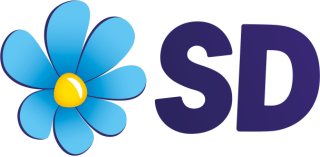
The Sweden Democrats is a nationalist and right-wing populist political party in Sweden founded in 1988. As of 2022, it is the largest member of Sweden's right-wing governing bloc to which it provides confidence and supply, and is the second largest party in the Riksdag.

The Swedish Social Democratic Party, formally the SwedishSocial Democratic Workers' Party, usually referred to as The Social Democrats, is a social-democratic and democratic socialist political party in Sweden. Founded in 1889, the SAP is the country's oldest and currently largest party.

The Christian Democrats is a Christian-democratic political party in Sweden founded in March 1964. It first entered parliament in 1985, through electoral cooperation with the Centre Party; in 1991, the party broke through to win seats by itself. The party leader since 25 April 2015 has been Ebba Busch. She succeeded Göran Hägglund, who had been leader since 2004.

The Centre Party is a liberal political party in Sweden, founded in 1913.

The Danish People's Party is a nationalist and right-wing populist political party in Denmark. It was formed in 1995 by former members of the Progress Party (FrP).
The Centre Democrats was a minor political party in Sweden, founded in 1974. While the party has described itself as a "centre alternative," it has been described externally as a right-wing populist party. It agitated against immigration from the 1980s, but toned down the issue in the 2000s, focusing more on local, social and economic issues. The party had some local representation from the 1970s, until 2006, when it lost its final local seat.

Bengt Carl Gustaf Westerberg is a Swedish politician. He was leader of the Liberal People's Party from 1983 to 1995, member of the Riksdag from 1984 to 1994 and Minister for Social Affairs and Deputy Prime Minister 1991 to 1994.
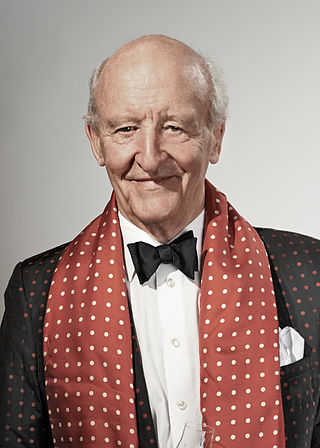
Count Ian Melcher Shering Wachtmeister af Johannishus was a Swedish industrialist and politician. He was a member of the Swedish Riksdag from 1991 to 1994. He was the son of Count Ted Wachtmeister and Adrienne, née De Geer.
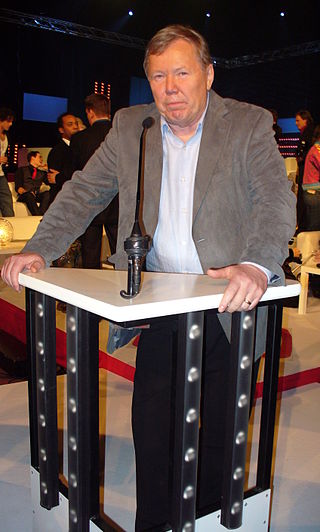
Bert Willis Karlsson is a Swedish record company manager, entrepreneur, and former politician and front figure of the New Democracy party.

The Alliance, formerly the Alliance for Sweden, was a centre-right liberal-conservative political alliance in Sweden. The Alliance consisted of the four centre-right political parties in the Riksdag. The Alliance was formed while in opposition, and later achieved a majority government in the 2006 general election and a minority government in the 2010 general election, governing Sweden from 2006 to 2014 with Fredrik Reinfeldt of the Moderate Party serving as Prime Minister of Sweden until 2014. The Alliance was co-chaired by every component party's individual leaders.
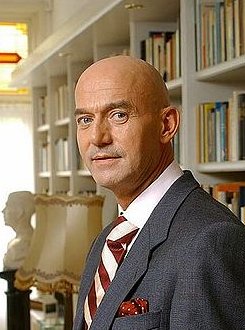
Fortuynism is the political ideology of Dutch politician Pim Fortuyn. Observers variously saw him as a political protest targeting the alleged elitism and bureaucratic style of the Dutch purple coalitions, as offering "openness, directness and clearness", populism or simply as charisma. Another school holds Fortuynism as a distinct ideology, with an alternative vision of society. Some argued that Fortuynism was not just one ideology, but contained liberalism, populism and nationalism.

Right-wing populism, also called national populism and right-wing nationalism, is a political ideology that combines right-wing politics and populist rhetoric and themes. Its rhetoric employs anti-elitist sentiments, opposition to the Establishment, and speaking to or for the "common people". Recurring themes of right-wing populists include neo-nationalism, social conservatism, economic nationalism and fiscal conservatism. Frequently, they aim to defend a national culture, identity, and economy against perceived attacks by outsiders. Right-wing populism has remained the dominant political force in the Republican Party in the United States since the 2010s.

General elections were held in Sweden on 9 September 2018 to elect the 349 members of the Riksdag. Regional and municipal elections were also held on the same day. The incumbent minority government, consisting of the Social Democrats and the Greens and supported by the Left Party, won 144 seats, one seat more than the four-party Alliance coalition, with the Sweden Democrats winning the remaining 62 seats. The Social Democrats' vote share fell to 28.3 percent, its lowest level of support since 1911.

General elections were held in Sweden on 14 September 2014 to elect all 349 seats in the Riksdag, alongside elections for the 21 county councils, and 290 municipal assemblies.
Welfare chauvinism or welfare state nationalism is the political notion that welfare benefits should be restricted to certain groups, particularly to the natives of a country as opposed to immigrants. It is used as an argumentation strategy by right-wing populist parties, which describes a claimed connection between the problems of the welfare state and, in essence, immigration, but also other social groups such as welfare recipients and the unemployed. The focus is placed on categorizing state residents in two extremes: the "nourishing" and "debilitating" and the contradiction between them in the competition for the society's scarce resources.
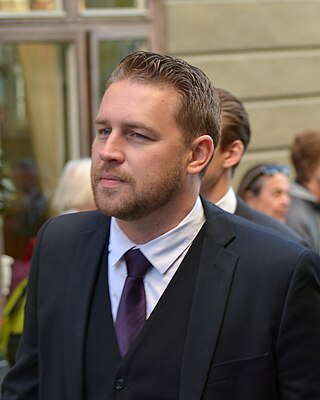
Hans Kennert Mattias Hedarv Karlsson is a Swedish politician who served as Leader of the Sweden Democrats in the Riksdag from September 2014 to November 2019. He has been a Member of the Riksdag (SD)since October 2010. He previously served as Leader of the Sweden Democrats from 2014 to 2015. He currently heads the conservative think-tank Oikos. Since 2022, he has also served as the party's international outreach secretary.

Tony Göte Sigfrid Wiklander is a Swedish politician of the Sweden Democrats party and a retired member of parliament who sat in the Riksdag from 2010 to 2018. Wiklander was previously the leader and chairman of the Progress Party.
Claus Peter Sigvard Zaar is a Swedish businessman and politician who was a Member of the Riksdag for the now defunct New Democracy party until 1994.
Vivianne Margareta Franzén is a Swedish retired politician and cosmetologist.



















